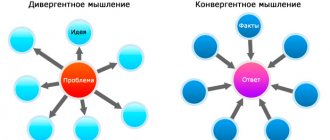How to develop deduction (deductive abilities)
In logic, the science of correct thinking, there are two types of inferences - deduction and induction. The word “deduction” comes from the Latin deductio, which means “deduction.” Deduction is a method of thinking in which the particular is deduced logically, as a result of a chain of inferences, from the general situation. That is, this is a type of reasoning from the general to the specific.
The term “deduction” not so long ago was known only to a narrow circle of specialists, but thanks to the hero of Arthur Conan Doyle’s detective novels Sherlock Holmes, who was called the master of the deductive method, the whole world learned about deduction.
Sherlock Holmes, starting from the general - the complete picture of the crime with its possible participants, went to the specific - looked at everyone who could have committed it, studied the motives, capabilities, behavior, and through logical conclusions determined the criminal, presenting him with indisputable evidence.
The simplest example of deductive reasoning:
- all metals are capable of conducting current;
- silver is a metal;
- therefore, silver also conducts current.
The method of deduction is opposed to the method of induction - when a conclusion is made on the basis of reasoning going from the particular to the general. For example:
- the Yenisei Irtysh and Lena rivers flow from south to north;
- the Yenisei, Irtysh and Lena rivers are Siberian rivers;
- therefore, all Siberian rivers flow from south to north.
Of course, these are simplified examples of deduction and induction. Conclusions must be based on experience, knowledge and specific facts. Otherwise, it would be impossible to avoid generalizations and draw erroneous conclusions. For example, “All men are deceivers, so you are a deceiver too.” Or “Vova is lazy, Tolik is lazy and Yura is lazy, which means all men are lazy.”
In everyday life, we use the simplest versions of deduction and induction without even realizing it. For example, when we see a disheveled man running headlong, we think he’s probably late for something. Or, looking out the window in the morning and noticing that the asphalt is strewn with wet leaves, we can assume that it rained and there was a strong wind at night. We tell the child not to sit late on a weekday, because we assume that then he will sleep through school, not have breakfast, etc.
Why develop inductive and deductive abilities
The deduction method can be useful in different life situations. When you need to find out the truth, and quickly. For example, if one of your loved ones gets into an unpleasant situation and is accused of a particular crime. Based on the available facts, you need to come to a true decision. Prove a person's guilt or innocence based on known facts.
The main thing for a person is that judgments are logical and lead to the truth. The development of deductive thinking is also useful in other situations when you need to prove the truth.
Is this real
It's worth starting with something encouraging.
Sherlock Holmes' abilities are absolutely real. And in general, the legendary character was copied by Conan Doyle from a living person - professor at the University of Edinburgh Joseph Bell. He was widely known for his ability to guess a person's character, background and profession from the smallest details. On the other hand, the existence of one real outstanding person does not guarantee success for everyone who tries to repeat his achievements. Mastering abilities comparable to Holmes's is incredibly difficult. In a different scenario, Scotland Yard wouldn't be running around Baker Street for clues, right?
How to develop deduction
Let's talk more about how to develop deductive thinking. Is this method easy to master? How to learn to use it correctly. To master deduction, you need to pay attention to all its components.
Pay attention to the little things
In order to develop deduction, first of all, you need to become more attentive. Try to pay attention to even the smallest details. When entering a room, remember: what is where, carefully study your interlocutor. When communicating with a person, ask him leading questions to put together the whole picture. Develop your powers of observation. Listen carefully to what they tell you. After all, minor details can help you make the right conclusion.
Develop your memory
Particular attention should be paid to memory. Train your memory in every possible way. Try to remember small details or play special games that train your memory. A good memory will help in using deduction.
You may also be interested in the articles Drugs to improve memory and attention in adults and Mnemonics: ways to develop memory
Learn to formulate
Learn to clearly formulate your thoughts and arguments. Make your speech as clear as possible, and make your arguments weighty and undeniable. Speak out loud and analyze how convincing you are. Think through every phrase. Develop your abilities.
Go deeper into the area
Try to delve into any field. Study deeply all the information that can be useful to you in the future. The more facts you know, the easier it will be to draw conclusions. Read different literature. Both artistic and popular science. Remember the dates of historical events, exact definitions. Watch different programs.
Concentrate
Try to concentrate as much as possible on your goal and thoughts. Throw away everything unnecessary and try not to be distracted. Don't be afraid to completely abstract yourself from the outside world and immerse yourself in your thoughts.
Learn body language
When speaking, pay attention to the person's posture and gestures. The body can tell what a person is trying to remain silent about. By studying body language, you can, by looking at your interlocutor, understand whether he is harming or telling the truth. By gestures and facial expressions, you can understand whether a person is nervous and draw logical conclusions based on this.
More interesting and useful information on the topic “How to read people” in the article Profiling. 10 rules and 20 tricks to read people like a book
Develop your intuition
In the method of deduction, intuition is as important as logic. Trust your feelings and try to develop your intuition.
Take notes
Keep a record of your observations and conclusions. This will help you not to forget anything and reach a conclusion faster. Write everything down. From small observations to facts.
Ask questions
Feel free to ask leading or clarifying questions. They will help you put together a complete picture of a person or situation.
Read more
Read different literature and memorize interesting facts. The more you know, the easier it will be for you to use the deductive method.
You might be interested in reading on this topic:
Book 1 -
Book 2 -
Listen more talk less
Your task is to draw the correct conclusion about the current situation. When communicating with people, listen more. Analyze everything that was told to you and draw conclusions mentally.
Be observant
Pay attention to everything. Don't neglect the little things. Develop your powers of observation. Collect as much information as possible, analyze all possible scenarios for the development of events. Discard everything unnecessary by elimination.
Practice
Practice drawing conclusions. When communicating with a friend or relative, try to use deduction and draw a conclusion. You can stage this as a magic trick or mini-show, telling the person something that you cannot know, and then consistently explain how you came to this conclusion, based on what information.
Expand your horizons
Try to study everything. Expand your horizons. Watch different movies and shows. Travel, communicate with people of different professions and interests. Read encyclopedias and dictionaries.
Develop flexibility of thinking
Try to solve one problem in different ways. Consider different options. Listen to other people's opinions.
This article will be useful to you Development of thinking, training, games, exercises
Develop voluntary and involuntary attention
Voluntary attention is the ability to focus on one thing without being distracted by anything. On average, a person can concentrate on one activity for 20 minutes. Try to develop this ability.
Involuntary attention is similar to peripheral vision. To train it, you need to observe familiar objects in unusual surroundings. For example, take a vase that has been sitting in a closet in the living room for years and move it to the kitchen table. You may notice a crack or a decorative element on it that was not noticeable before.
Combine deduction and induction
Don't just focus on deduction. Use the induction method if necessary. Learn both methods and try to use them. Look at the situation and circumstances.
Create puzzles
Come up with your own tasks to develop logic and memory. Start with easy riddles to develop logic and gradually complicate them.
Solve problems
Problems in physics or mathematics will help develop logical thinking. You can also:
- Solve puzzles;
- Solve puzzles;
- Play chess or poker.
What he does is real. But what is he doing?
He acts, demonstrates his arrogance, pride and... remarkable intelligence. All this is justified by the ease with which he solves crimes. But how does he do it?
Sherlock Holmes's main weapon is the deductive method. Logic backed by intense attention to detail and outstanding intelligence.
To this day there is debate as to whether Holmes uses deduction or induction. But most likely the truth is somewhere in the middle. Sherlock Holmes accumulates his reasoning, experience, clues to the most complicated cases, systematizes them, collecting them into a common base, which he then successfully uses, using both deduction and induction. He does it brilliantly.
Most critics and researchers are inclined to believe that Conan Doyle did not make mistakes and Holmes really uses the deductive method. For simplicity of presentation, further we will talk about it.
Don't forget about memory
You probably remember the episode where Sherlock doesn't remember that the Earth revolves around the Sun. No, it’s not at all a matter of the great detective’s poor memory. He admits that he deliberately cleared his brain of unnecessary information. What conclusions can be drawn from this? Firstly, memory can and should be trained: you will be surprised how much information your brain can accommodate. Secondly, the choice of information should be approached responsibly. Don't clutter your head with numerous advertising posters, stupid literature and low-brow films. Remember: this will all be stored in your memory. Therefore, it is worth considering: do you really need this information?
True detective quality
Corrosiveness is a quality that is certainly necessary for a true master of deduction. But true corrosiveness is unthinkable without curiosity. Therefore, those areas that arouse curiosity should be used as a testing ground for practicing deductive skills. Having worked out the scheme on things of interest, it will be easy to apply it to any task. Emotional perception of an object leads to a deeper perception, which means the brain will work with double force.
What is the use of being able to think logically?
Deduction training allows you to achieve significant success by avoiding patterns. In studies, the ability to analyze and think logically helps to better and faster understand the subjects being studied. In work, skills allow you to make a rational decision and think through actions several moves ahead. In everyday life, analytical skills help to better understand people and situations and build the most effective relationships with others.
Thinking training
The most spontaneous answer to the question of how to become Sherlock might sound like this: “First, buy yourself a black coat.” If we use the terminology of the American psychologist, Nobel laureate Daniel Kahneman, who published the book “Thinking Slowly... Decide Fast” in 2011, this is a reaction of the so-called “fast thinking” - a system that is responsible for momentary knowledge of the world and cataloging instinctive sensations. “Fast thinking” reacts to circumstances instantly and very directly, as a result of which it often makes mistakes, forcing us to make irrational decisions.
But in order to think like Sherlock Holmes, you need to use a different system - “slow”. It is she, according to Kahneman, who is responsible for the deliberate and conscious formation of thoughts, decisions, conclusions and assessments. Like any function of the human brain, the slow thinking system can be strengthened and developed.
As in sports, training should begin with light exercises in small quantities, gradually moving to more complex and longer ones. To begin with, you can borrow several school textbooks from friends in different subjects: mathematics, physics, chemistry and other disciplines that involve solving problems. This will help not only to train the slow thinking system (after all, it is this system that is used in the process of intellectual activity), but also to broaden one’s horizons, restoring knowledge lost since schooling and identifying interesting scientific areas for study.
With proper organization and planning, a home office is not a punishment, but an opportunity. For business - to save resources, for employees - to get rid of the feeling that life is passing by. If you do not neglect the rules of the organization, learn management from a distance, use modern technologies and systems, you can set up an effective home office for employees in just one day. More about the BeeFREE solution from Beeline Business at the link.
Corrosiveness is another quality required by a future master of deduction. To cultivate it in yourself, you need to find areas that truly arouse curiosity. What exactly they will be, by and large, does not matter: an emotional response always pushes a person to deeply study a subject, forces him to constantly increase the amount of knowledge, and with it the extent of the border of contact with the unknown, the existence of which invariably prompts the mind to new searches.
Article information
This article was produced by our experienced team of editors and researchers, who reviewed it for accuracy and comprehensiveness.
Categories: Personal Development
In other languages:
English: Develop the 'Sherlock Holmes' Intuition, Italiano: Sviluppare l'Intuito alla Maniera di Sherlock Holmes, Español: desarrollar la intuición de Sherlock Holmes, Português: Desenvolver a Intuição de Sherlock Holmes, Français: développer l'intuition de Sherlock Holmes, Deutsch: Eine Intuition wie Sherlock Holmes entwickeln, 中文: 培养福尔摩斯式的直觉能力, Nederlands: Intuïtie als die van Sherlock Holmes ontwikkelen, Tiếng Việt: Phát triển trực giác “Sherlock Homes ", العربية: التمتع بسرعة بديهة شارلوك هولمز
This page has been viewed 34,765 times.
Was this article helpful?
Not really
Puzzles
Everyone probably knows the riddles. There are a great many of them and they perfectly develop logic. If you can't guess the riddle, don't rush to look at the answers. Try to logically come to the answer yourself, even if it takes you a few days.
Don't forget that the best riddles are riddles with a trick. They allow you to develop logic and deduction much more effectively than simple ones.
Examples of riddles for logic and thinking:
- Two people approach the river. There is a boat at the shore that can only support one. Both people crossed to the opposite bank. How?
- Where does it happen that a horse jumps over a horse?
- Sherlock Holmes walked down the street. And suddenly he saw a dead woman lying on the ground. He walked over, opened her bag and took out her phone. He found her husband's number in the phone book. He called. He says: “Come here urgently. Your wife is dead." And after a while the husband arrives. He looks at his wife and says: “Oh, honey, what happened to you???” Then the police arrive. Sherlock points his finger at the woman’s husband and says, “Arrest this man. He killed her." Question: Why did Sherlock think that?
- The jar is on the table. It stands so that one half of it is in the air, and the other is on the table. What is in the jar if it falls in half an hour? And why?
- A man went to sea and got caught in a storm. He was carried to an island where there were no men, and only girls lived. In the morning he woke up covered in ropes at some ritual and found out that they wanted to kill him. And he asked for the last word. After he voiced it, the girls made him a boat, gave him food and water, and sent him home. What did he say?
- A 1st grade student solves this riddle in 5 minutes, a high school student in 15 minutes, a student in 1 hour, but a professor will never solve it. Riddle: decipher ODTCHPSHSVDD.
- It is known that among the nine coins there is one counterfeit one, which has less weight than the others. How can you identify a counterfeit coin in two weighings using a cup scale?
- Cat – 3, horse – 5, rooster – 8, donkey – 2, cuckoo – 4, frog – 3. Dog – ?
- Three criminals met: the bugbear Belov, the burglar Chernov and the pickpocket Ryzhov. “The amazing thing is that one of us has black hair, the second one has white hair, and the third one has red hair, but none of us have the same hair color as the last name,” said the black-haired man. “And, really...” said the bugbear Belov. What color is the pickpocket's hair?
- A father and two sons went on a hike. On their way they met a river, near the bank of which there was a raft. It can support either a father or two sons on the water. How can father and sons cross to the other side?
Answers:
- They were on different banks.
- In chess.
- Because Holmes did not tell his husband the address.
- Ice.
- Let the ugliest one kill me.
- One. Two. Three. Four. Five. Six. Seven. Eight. Nine. Ten.
- First weighing: 3 and 3 coins. The counterfeit coin is in the pile that weighs less. If the piles are equal, then the fake is in the third pile. Second weighing: from the pile with the least weight, 1 and 1 coin are compared. If they are equal, then the remaining coin is fake.
- Cat – “meow” (3), horse – “ee-go-go” (5), rooster – “cuck-ka-re-coo” (8), donkey – “ee-a” (2), cuckoo – “ku-ku” (4), frog – “qua” (3), dog – “woof” (3).
- Belov is not white because of his last name and not black, since he answered the black-haired one. That is, Belov is red. Chernov is not black because of his last name and not red, since the red one is the bugbear Belov. Pickpocket Ryzhov was left with black color.
- First, both sons cross. One of the sons returns back to his father. The father moves to the opposite bank to join his son. The father remains on the shore, and the son is transported to the original shore after his brother, after which they both are transported to their father.
Expand your horizons
Only a comprehensively developed personality is able to draw conclusions based on a base of knowledge and experience. Otherwise it will just be guesswork. Expand your horizons. Deep knowledge in many areas can become a support in making the right decisions and making logical judgments.
Dictionaries, encyclopedias, reference books, films, books and travel will provide you with an invaluable service.
Scientific basis
Sherlock Holmes does amazing and exciting things, but they have no scientific basis!
This can be said by a person who is confident that the ability to solve crimes is based on some unique abilities of the hero. And he turns out to be wrong. When an experienced practicing chemist combines various substances, their reactions can resemble a magic trick - they change color and structure, explode, hiss... In general, a chemical experiment is like a real miracle. But this is for us, ordinary people, who are not aware of the formulas. For a scientist who has devoted years to research, read dozens of books and scientific papers, and received more than one burn from reagents, this is not a miracle at all, but the result of long and hard work.
But at the same time, complex long-term scientific developments can look like simple and interesting demonstrations bordering on entertainment.
It's the same with the deductive method - it seems like everything is simple. But in fact, this is just the result of scientific research, long and painstaking research, studying tons of statistical material... In general, boring science in its purest form.
Further in the article you can find out exactly what logical laws and other techniques Sherlock Holmes used in his work. But first you need to understand the concepts.
The name of the deductive method comes from the Latin word deductio, that is, inference. This means that in deduction the solution to a problem is accomplished by deducing the particular from the general using logical laws. The catch is that in reality Sherlock did not use the deductive method in his investigations, but the opposite method - the inductive one. It is based on the fact that the general is derived from the particular; the full picture emerges when studying the details. But this is exactly what the great detective did - he compared the evidence and all available information, completed the unknown details of the crime committed and received a ready-made chain of events.
Nevertheless, Mr. Holmes still, albeit nominally, used the deductive method, instructing his followers: “If you reject what is not comparable with the available facts, only one answer remains. And even if it seems impossible, it is right.”
Sherlock Holmes paid close attention to the clues of his intuition. He argued that sometimes it is easier to understand something than to explain to others how it was done. For example, you will have no doubt that two and two equal four. But explaining why you are so convinced of this will be much more difficult.
Be meticulous
If you undertake to study any fact or subject, you should do this as carefully and comprehensively as possible. The object of research should arouse your interest and emotional response, because only in this case can you hope for a good result.
For example, when reading a book or watching a movie, pay attention to various details of the hero’s behavior and appearance. Try to predict the further course of events. It is most useful to conduct such experiments with films and books of the detective genre.
What does the mind of Sherlock Holmes do?
Deductive method
This is the detective's main weapon, which, however, would not work without a number of additional components.
Attention
Sherlock Holmes captures even the smallest details. If not for this skill, he simply would not have material for reasoning, evidence and leads.
Knowledge base
The detective himself said it best:
All crimes show great generic similarity. They (Scotland Yard agents) introduce me to the circumstances of a particular case. Knowing the details of a thousand cases, it would be strange not to solve the thousand and one.
Sherlock Holmes
The palaces of the mind
This is his excellent memory. This is the repository that he turns to almost every time he is looking for a solution to a new riddle. This is the knowledge, circumstances and facts accumulated by Holmes, a significant part of which cannot be obtained anywhere else.
Constant analysis
Sherlock Holmes analyzes, reflects, asks questions and answers them. Often he even resorts to double analysis, it is not in vain that the detective constantly acts together with his partner Dr. Watson.











